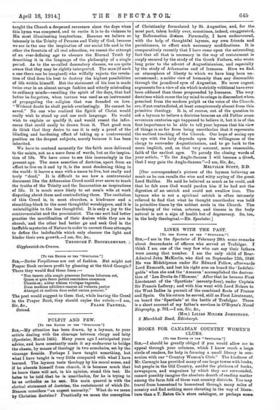PULPIT AND PEW.
[To TIM Tones Or TIM "SPECTATOR."] SIB,—My attention has been drawn, by a layman, to your article dealing with the cleavage between clergy and laity (Spectator, March 14th). Many years ago I anticipated your adviee, and have constantly made it my endeavour to bridge the chasm, by means of theology in two armchairs, set by the vicarage fireside. Perhaps I have taught something, but what I have taught is very little compared with what I have learned. The layman tests theology. by his moral sense, and if he absents himself from church, it is because much that be hears there will not, in his opinion, stand this test He hates to be told that be is unorthodox, for he is trying to be as orthodox as he aan. His main quarrel is with the clerical statement of doctrine, the restatement of which Dr. Henson considers "an urgent necessity." What do we mean by Christian doctrine? Practically we mean the conception
of Christianity formulated by St. Augustine, and, for the. most part, taken bodily over, sometimes, indeed, exaggerated.. by Reformation divines. Personally, I have endeavoured, with the help of thoughtful laymen, my own friends and parishioners, to effect each necessary modifications. It is comparatively recently that I have come upon the astounding. fact that all that is necessary in the way of restatement is. amply secured by the study of the Greek Fathers, who wrote long prior to the advent of Augustinianism, and especially by the study of Athanasius and of Irenaeus. Here we find. an atmosphere of liberty to which we have long been un- accustomed; a nobler view of humanity than any discernible. through the jaundiced eyes of Augustine. No more cogent.. arguments for a view of sin which is strictly volitional have evec been adduced than those propounded by Irenaeus. The very, doctrines which cause the lay mind to cringe in discomfort when, preached from the modern pulpit as the voice of the Church., are, if not contradicted, at least conspicuously absent from this- primitive theology. It is, of course, out of the question to ask a layman to believe a doctrine because an old Father some. seventeen centuries ago happened to believe it, but it is of the. first importance to be able to tell your layman that his view of things is so far from being unorthodox that it represents. the earliest teaching of the Church. Our hope of seeing eye. to eye with the laity depends upon the willingness of the. clergy to surrender Augustinianism, and to go back to the more implicit, and, on that very account, more reasonable,. faith of the earliest ages. To parody the closing words of your article, " To the Anglo-Saxons I will become a Greek,. that I may gain the Anglo.liaxons."—I am, Sir, Sic., MELVILLE SCOTT, B.D.
[Our correspondent's picture of the layman believing as, much as he can recalls the wise and witty saying of the great. Lord Halifax. He said he believed as much as he could, and that he felt sure God would pardon him if he had not the. digestion of an ostrich and could not swallow iron. The layman who is not a spiritual ostrich is often intensely relieved to find that what he thought unorthodox was held, in primitive times by the noblest souls in the Church. The hardening of the veins, arteries, and tissues in the body natural is not a sign of health but of degeneracy. So, too,.
in the body theological.—ED. Spectator.] .










































 Previous page
Previous page